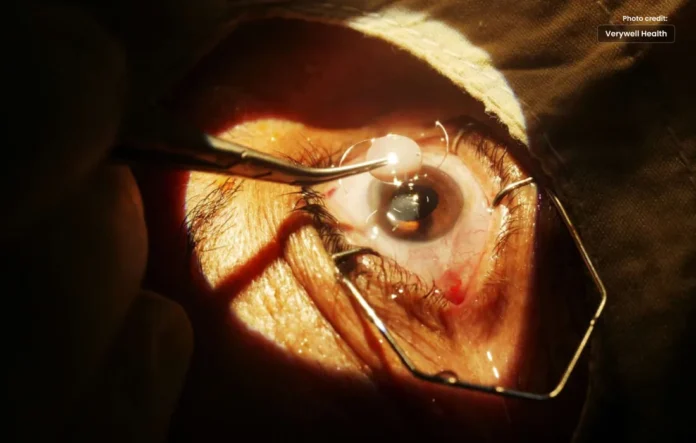The Cataract surgery is a common procedure that has its disadvantages.
Before having the cataract surgery, patients should be informed of the risks and potential disadvantages, just like with any surgical intervention.
What is Cataract Surgery?
The natural lens of the eye becomes clouded with cataracts, a common age-related disorder that, if ignored, results in poor vision and eventually visual loss. Cataract surgery involves taking out the clouded lens and replacing it with an artificial intraocular lens (IOL) in order to restore vision.
Read More Informative Articles in Urdu
Elevated Achievement Rates and Enhanced Life Quality
Prior to discussing the drawbacks, it is important to recognize the amazing advantages of cataract surgery. Many patients see considerable improvement in their vision after this treatment, which improves their quality of life and enables them to easily resume everyday activities. Most cataract procedures are successful, improving the patient’s eyesight and posing few problems.
Possible Drawbacks with Cataract Surgery
Risk of Infection
- There is a chance of infection with cataract surgery, just like with other surgical operation. Post-operative infections are uncommon, but they can cause major problems that need to be addressed with more care or surgery.
Inflammation
- After cataract surgery, inflammation of the eye is a typical side effect. Severe inflammation can cause visual impairments and lengthen the healing period, however the majority of instances are moderate and can be treated with medicine.
Corneal Swelling (Edema)
- After cataract surgery, some people may have corneal swelling or edema, especially if they already have eye diseases like Fuchs’ dystrophy. In order to manage corneal edema, which can cause discomfort and blurred vision, extra care is needed.
Posterior Capsule Opacification (PCO)
- Even after a cataract is successfully removed, the posterior capsule, a secondary membrane, may eventually cloud over, resulting in a condition called posterior capsule opacification (PCO). A straightforward laser operation known as YAG capsulotomy may be required to restore clarity when PCO causes vision to become hazy again.
Refractive errors
- Although the goal of cataract surgery is to correct vision, some individuals may leave the procedure with residual astigmatism, farsightedness, or nearsightedness. To get the best possible vision correction in these situations, glasses, contact lenses, or more surgical procedures might be required.
Retinal Detachment
- After cataract surgery, retinal detachment is a potentially fatal but uncommon complication. Symptoms that patients may encounter include bright flashes, floating objects, or a shadow that moves like a curtain over their field of vision. In order to avoid irreversible vision loss, prompt medical intervention is necessary if retinal detachment is suspected.
Glaucoma
- Known to be characterized by increased intraocular pressure and damage to the optic nerve, glaucoma may become worse after cataract surgery. Before and after cataract surgery, patients with risk factors or pre-existing glaucoma should be properly monitored.
Issues with Intraocular Lenses (IOLs)
- Although contemporary IOLs are engineered to yield superior visual results, issues including dislocation, decentration, or intolerance to specific IOL kinds might arise. Minimizing the risk of issues requires selecting the best IOL based on criteria such ocular health, visual needs, and lifestyle.
The Pros and Cons of Cataract Surgery
Pros
- Enhanced eyesight: You can see objects more clearly after having cataract surgery, which can greatly improve your vision.
- Improved quality of life: Cataract surgery can help you regain freedom and enjoy everyday activities by restoring your vision.
- rapid and safe procedure: Cataract surgery is comparatively rapid and safe now that technology has advanced.
- Minimal discomfort: The majority of patients have very little discomfort both during and after surgery, which facilitates a fairly easy recovery.
Cons
- Potential hazards include infection, hemorrhage, and retinal detachment, just like with any surgical operation. These dangers are rather uncommon, though.
- Cost: While some costs are covered by Alberta Health, premium lens implants, eye drops, and new glasses may incur extra charges.
- Time needed for recovery: Even if the operation is brief, it could require some time. You will need to see your optometrist for follow-up appointments, adhere to postoperative instructions, and rest for a few weeks.
Conclusion
Even though cataract surgery is a very safe and effective operation, it’s important for patients to be aware of any potential dangers and drawbacks. Patients can make well-informed decisions about their alternatives for eye care and treatment by talking with their ophthalmologist about these worries and carefully balancing the advantages against the dangers. The main objectives of cataract surgery are to improve eyesight and quality of life, and most patients have positive results when their conditions are properly evaluated and managed.
Also read this: The Silent Dangers: Knowing the Disadvantages of Neglecting to Burp




